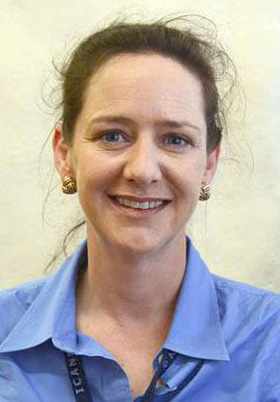|
So
how does one woman become not only a "Jill of all
trades" but one who is not just a practitioner, but a master
of so many pursuits? That story begins in Myrtle
Beach, South Carolina where Angie was born to a
mother who was a 4th generation native of the area and
a father from Greenville who played major college
football at the University of South Carolina.
Angie also has a brother that followed 13 months after
her and they looked so much alike when they were young
people thought they were twins.
"My
mother had been a stewardess (that’s what they were
called then) for Delta before marrying my
father and becoming a deeply dedicated full-time
mother and wife," Angie told us. "My father
was a school teacher and entrepreneur before he went
into the beverage business—initially as a
salesperson, as his father had been for 32 years—and
then as a manager, working his way up the ranks at Pepsi
and then Coca-Cola. We moved 17 times by the time I
graduated high school. In my youth, I lived in
up to three different cities in each of these states: Maryland, North Carolina, South
Carolina, Florida, Georgia, Alabama, Mississippi,
Louisiana, Tennessee, Missouri and Texas."
|

Budding
entrepreneur Angie Graves on her
6th birthday at home in South
Carolina. |
While
she would spend much of her youth on the go,
Angie was anchored in South Carolina long
enough to experience the quintessential
American introduction to entrepreneurial life
- though her version had a unique twist that
foreshadowed her future in the tech
world.
"Most
children find a business sense with the corner
lemonade stand but mine was a search
engine stand," Angie said. "I
spent most of my summers in Myrtle Beach, and
from the time I was about four years old until
I was seven, I had a playmate there named
Katherine. We had the idea one summer to
make money by the roadside—on a very short
street in a small neighborhood. We found the
box for a new washing machine and painted it
to look like a computer, with multi-colored
rectangles and squares across the front.
A slot was cut into it for index cards to be
inserted into the box. One of us would
sit inside, and the other would stand outside,
offering passersby the answer to any
question they wanted to write down, for
just 25 cents per question. We both learned a
lot from it about marketing and customer
service," she smiled.
|
"At
age seven, my entrepreneurial spirit was put to the
test when my father set me up to sell at a flea market
stand," Angie continued. "Just before sunrise, he took me and about
100 cases of a cleaning product to a table he had
rented there. He handed me an empty bank
envelope and told me the price for each unit.
And he told me to fill the bank envelope with money
and to empty the table of the cleaning products.
Then he left. When he returned 13 hours later,
he found that I had done just that, and he let me
keep all the money. He always had useful lessons
for me to learn, especially to try new things."
A lot
of people are drawn to the entrepreneurial life for
the freedom it affords. Yes, it can be risky but you
can try your hand at whatever it is you really want to
do. When Angie was 16 her mom's sister arranged to
enroll her in college and she promptly set about
re-shaping the traditional campus experience into a
customized creation of her own.
"I
asked myself what it was that I most enjoyed doing
right now, which was listening to music and
traveling. I dedicated myself to learning how to get
paid to do at least one of these things, and began
taking classes in stagecraft, lighting design, and
costuming. Along with taking theater
classes, I began writing articles for local
publications, and doing reviews of live performances
and interviews with actors and musicians and other
performers," Angie recalled.
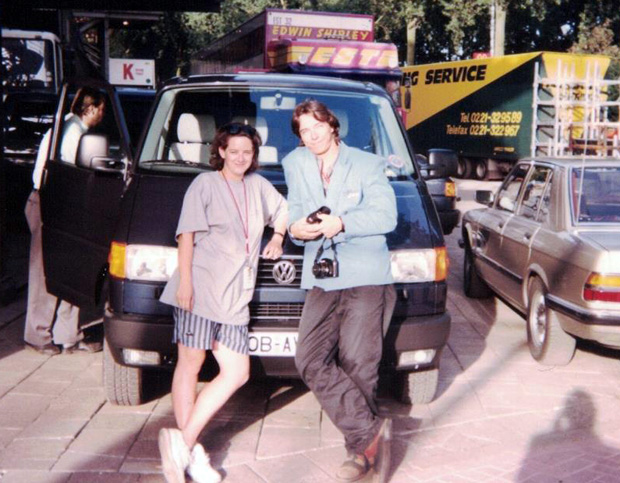
When
Angie Graves (at left above in Rotterdam,
Holland with one of the limo drivers on the 1992
Genesis We Can't Dance Tour) started
writing music reviews for local publications as a
teenager she had no way of knowing it would lead to
her touring the world with a top tier rock band).
"On a flight from
New York
City to Los Angeles I met a famous author.
We were seatmates and spent the entire flight engaged
in conversation. At the end, we vowed to keep in
touch (we still are!), and he connected me with the
then-editor of Rolling Stone magazine and the
entertainment editor of the Los Angeles Times.
In the next year or two, I
interviewed a lot more performers including Stevie Ray
Vaughan, Frank Zappa and all of the members of the
band Chicago. I also wrote articles about new
young entertainers for teen magazines in Australia and
Europe - but, as it happened, never for Rolling Stone or the
LA Times - that’s just how it worked
out!"
"What put me in the orbit of some
great artists was working as a local support person
for them. Sammy Davis, Jr., Def
Leppard, Bruce Springsteen, INXS, R.E.M.,
Kiss, Bon Jovi, Neil Diamond, Whitney Houston and so many others were
performers I worked for as little as one day, or for
as long as two or three months. As a young
person just starting out, it was very educational to
be able to work with the leaders in the industry.
I learned a lot about professionalism and discipline
from these pros that serves me to this day,"
Angie said.
"Following graduation from
the University of South Carolina, I
went to work in Houston, Texas for a sound and lighting
production company doing work in logistics and
contract agreements. Some of our clients were
President George H. W. Bush, ZZ Top and the country
musician Clint Black. Two of my co-workers there
were survivors of the infamous Lynyrd Skynyrd plane
crash. I worked closely with White House
Communications for our frequent events and appearances
with George Bush as President of the United States."

Above:
Angie's
view from a helicopter looking down on the 1992
Genesis We Can't Dance Tour concert venue in
Mannheim, Germany.
Below:
Angie's backstage office at another tour stop in
Basel, Switzerland.
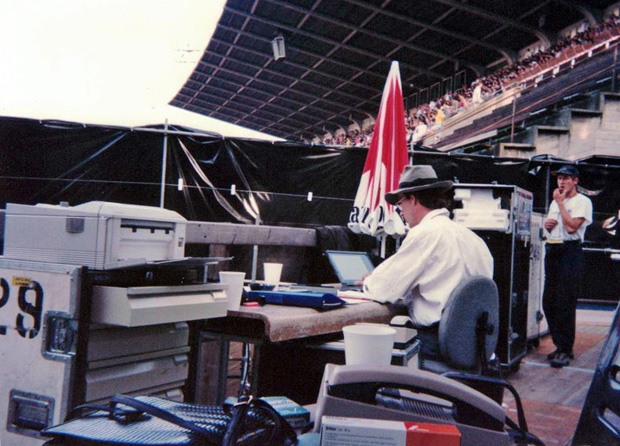
Angie's
opportunity to go on tour with Genesis came from one
of those simple twists of fate that produce a once in
a lifetime opportunity. "I took a day off work at the
sound and lighting company in Houston to help a friend
who was short an office worker for tour rehearsals for
a band," Angie remembered. "The band was
Genesis and the
rehearsals were taking place in a blimp hangar near my
apartment. After the one day of work for
Genesis, I took the risk that they would call me back
and quit my job at the sound and lighting company
where I had worked for more than a year."
"Thankfully, Genesis did call me
back, and I spent the next several weeks reporting to
work at the blimp hangar. The relationships
forged there led to me joining the 1992 tour - Genesis – We Can’t Dance – traveling through
22
countries in five months’ time, and playing dates
like Hockenheim Raceway for 400,000 fans, the
Hippodrome in Paris, Knebworth, and a number of music
festivals. I worked for a man who was a legend
in the music business for accomplishing the
impossible. For the first couple months my
working hours were 8am to 4am, five or six days a
week," Angie said.
In
addition to working the kind of long hours
entrepreneurs are familiar with Angie also got a
chance to broaden her professional horizons even
further. "I started the We Can’t
Dance tour as the office manager and ended the tour
as one of four site coordinators, traveling ahead of
the production to arrange placement of the trucks, the
stage, dressing rooms, and to liaise with the local
promoter and labor and others in preparation for the
arrival of our 47 lorries (18-wheelers) and 208
touring personnel."
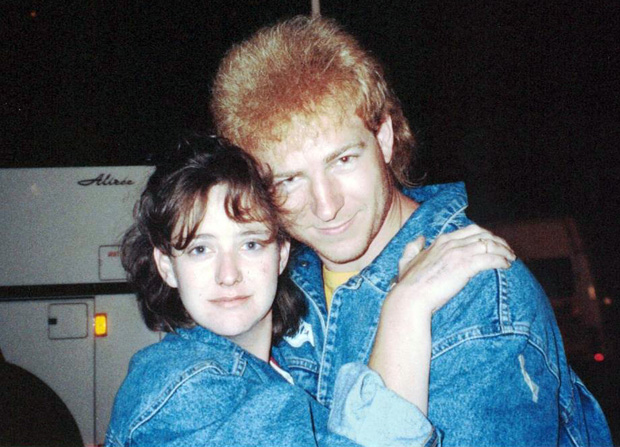
Time
to say goodbye - Angie Graves and colleague Eddie
Harbin
at the end of the 1992 Genesis We Can't Dance Tour.
"In 1993 and 1994, I did some
logistics work for Pink Floyd, three months of
rehearsals for a George Lucas production, and weeks of
production rehearsals for U2’s Zoo TV tour.
And I did Internet consulting work for some music
business companies including a white glove celebrity
shipping service called Rock-It Cargo. But by
that time, I was sold on the Internet and wanted to
transition out of music and into the Internet
fulltime," Angie said, looking forward to a major
course change on her career path.
"I traveled to
San Francisco in
search of servers for a private network I was
designing. I was determined to build a
private online network for the concert touring
industry because of an incident that
occurred during the Genesis tour, where lack of
communications nearly cost us $1 million.
While there, a contact from The
Well, Mark
Graham,
introduced me to a number of Internet pioneers -
people like Cliff Figallo, John Barlow,
Mitch Kapor, Stewart Brand, Kevin
Kelly,
Matisse Enzer, Nancy Rhine and so many others.
Mark himself is a pioneer—founder of PeaceNet.
The rest I knew of either from The Well or Wired—the
two were intermingled," Angie said.
"I learned from them—in
conversation in person, on the phone and at The Well -- new ways of organizing people and
information, and new ways of thinking—all enabled by
the Internet. We knew that the Internet would
alter human civilization, and we were talking
together, imagining the ways how."
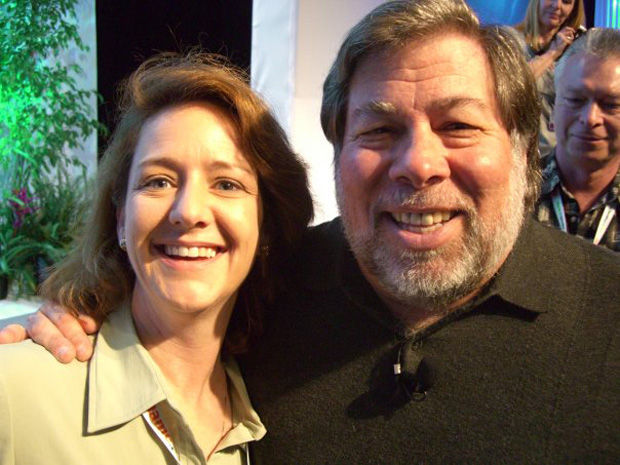
Angie
Graves met many Internet and tech pioneers during
the mid 90's in San Francisco. About 15 years later
she is seen here with another one- Apple Co-Founder
Steve Wozniak - at the 2009 DOMAINfest Global
Conference in Hollywood, California.
With Angie
in the middle of what was happening
in the early days of the web she was perfectly positioned
to stake a claim on Internet real estate that would
one day be worth millions of dollars if she had been
so inclined - but that was an option she couldn't even
consider at the time.
"There was
one taboo among this
group—commercialization of the
Internet," Angie recalled. "As I
understood it, to do anything commercial was to
violate social code and ignore the purpose of the
Internet, which was research and communications and
community, not commerce. At the time, what became the
backbone of the Internet was NSFNET, administered by
the National Science Foundation, in cooperation with
the Merit Network and others, and it was most
definitely intended primarily for research and
education. It was meant to foster scientific
discovery, conversations across continents and
cultures, and to provide rich resources for students
on any topic."
"The
organizations that were on the Internet at the time
were primarily universities and colleges. Some
corporations were on then, but mainly just the
departments containing their laboratories or research
arms. In keeping with that trajectory,
and in deference to my Internet gurus, any domain name
I registered would need to be for personal or vanity
purposes. The more commercial the intent, the
greater the negative pressure from the community."
"Imagine the few thousands of us
online, all in tacit agreement to disallow the
tainting of this pure resource with commercialism -
and here I am, 21 years later,
as part of ICANN’s Business Constituency, a
commercial interest group!," Angie marveled,
keenly aware of the irony.
Though
Angie did not take advantage of that very
early opportunity to amass domains she still
had some world class assets wind up in her
hands. She had moved from Myrtle Beach to
Atlanta to take advantage of cheaper Internet
access and wound
up being hired to run the sales center at Atlanta.com
(the city's sole Internet Service Provider at
that time). "The owner showed me how he
registered Atlanta.com, WWW.com and other domain
names," Angie said. "I was hard at work building
my
private network so
I registered the name that I had chosen for
it - COM1.com in July 1994."
|
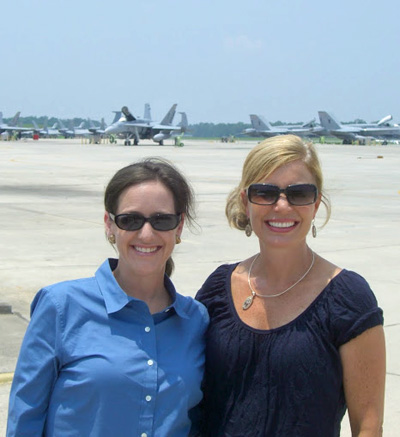
Angie
Graves (left) and Mary Delle, a
friend since elementary school, on the tarmac at
the Beaufort Marine Corps Air Station in South
Carolina (where Mary's husband was a senior
officer). |
The
next year Angie would register a significant number of
domains for the first time but the only reason she did
it was to
give them away. "It was nearing Christmas and I
didn’t have the budget to buy nice gifts for my 13
family members. So, knowing that domain
registrations were free at the time, I got the idea to
give each of them a domain name instead. For my younger relatives, I
registered their names mainly. My aunts got
their three-letter initials, and my grandparents got
the FAA abbreviation for Myrtle Beach - MYR.com.
The husband of one of my cousins had just become a
lasik surgeon, so I got him lasik.com, or maybe
prolasik. And champion.com for my brother who
revered athletic achievement. For my uncle, a
lifelong fisherman who organized many bass fishing
tournaments over more than a decade, my aunt suggested basspro.com."
"To prepare the gifts, I printed
the names in large type on blank certificate paper
and included on the back instructions for maintaining
the registration. Putting a certificate in each
of 13 envelopes marked the completion of my Christmas
preparations for that year. Aside from my
brother, who coordinated the transfer of champion.com
to me, all of my other relatives let their names
drop.
I was fortunate to have been able to scoop-up some of
them…mainly the three-letter dot coms…and let
lasik and the rest go," Angie recalled.
|
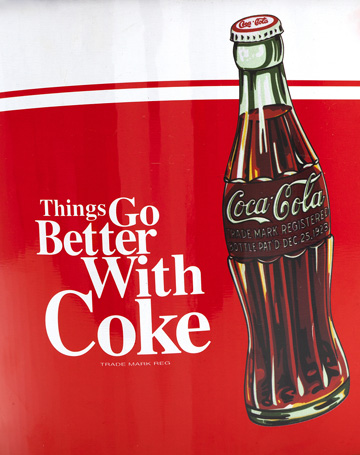
Vintage
Coca-Cola sign image from Bigstock |
At
the top of this story I mentioned that Angie
was the original registrant of Coca-Cola.com
- one of the most recognizable trademarks in
the world - but she was no "cyber
squatter" - quite the opposite in fact.
Angie gave us the back story on that. "During those times, the most
exciting day for me of each month was the day I
received my issue of Wired magazine. In this
particular issue, October 1994, was an article by a
then reporter for Newsday named Josh Quittner called
“Billions
Registered,” showing that corporations were
ignorant of the greatest means of communication the
world has ever known, and using McDonald’s
Corporation as his example. The article went on
to mention Coke.com, and a kid in Russia who was
reportedly holding the name hostage until he received
$1 million from The Coca-Cola Company."
"It had never occurred to me
before that a large company with so many resources
could be left so vulnerable. With my father who
was then an officer at Coca-Cola Enterprises (now The
Coca-Cola Company), and with coke.com already
registered outside
|
|
the reach of US law, I anxiously
registered Coca-Cola.com and immediately called my
father to tell him. I may as well have been speaking
a foreign language. My father didn’t
understand even the context. But I did reach out
to Josh Quittner via The Well and we had an enjoyable
conversation about it." |
"The same day, I got a call from a
man identifying himself as a Coca-Cola employee from
the legal department. I explained my purpose for
the registration, and he explained that he was in
computer tech support for the attorneys. That man and
his wife became my business partners a year later when
we formed WEB Group, Inc. Coca-Cola eventually did call and
ask for the name back, so I changed the administrative
contact to the name of the man who called, and I told
him that he would need to update the rest of the
registration record. No money or other
compensation changed hands. It wasn’t until
many years later that my name was finally removed from
the registration details for coca-cola.com."
|
WEB Group, Inc.,
founded in 1995 is still Angie's baby.
It was designed to be an
“Internet Presence Management” company. The skill
set she has used to help build WEB Group was largely self taught and sharpened while she
spent two years designing her private network.
She also honed her sales and marketing talents
while producing a 400% increase in
Atlanta.com's user base. Her accomplishments
did not go unnoticed. |

|
"In
September 1996 I interviewed for a job that I had coincidentally found online via a
posting at Usenet News. Twelve days later I was
in a first class seat flying to Sydney, Australia, to
design the continental Internet infrastructure for the
telephone company there — Optus, and build its ISP
business. I spent the remainder of 1996 and the
majority of 1997 as Managing Consultant on the
project."
During
this time frame Angie also returned to one of her
first loves - writing - for a time, doing articles for
Computer Currents magazine and writing a
chapter for a book published by Macmillan.
"My articles for Computer Currents
were all on the topic of web marketing, and I usually
wrote about understanding customers and gave timeless
advice about the importance of communication and
relationships for online business," Angie said.
"When I wrote the Trade and
International Issues chapter for a Macmillan
Publishing book, I was on holiday break from my work
in Australia."
"After the Optus project ended in
August 1997, I moved back to Atlanta, and WEB Group
consulted to a number of companies. I chaired the Intranet Steering
Committee at Siemens Corporation, and was webmaster
for Georgia-Pacific, for example. And for
Sprint, designing online marketing for them, and
Coca-Cola—designing, contracting and implementing
their first stock quote script on their website, and
consulting to them about their overall online
presence."
In 1998, I took a job at
IBM
Global Networks in Houston—and led a project
architecting a 54-country private network for one of
IBM’s clients, an oil production services company.
I designed mobile, satellite, terrestrial connectivity
and equipment for places I had never before even heard
of—like Gabon and Kabinda. And deployed
equipment in some dangerous and war-ravaged places,
like Bosnia, where we had ex-special forces guys
jumping out of helicopters in flak jackets to
power-cycle our routers," Angie said.
When
AT&T purchased
IBM Global Networks in 1999 Angie wound up serving AT&T as an
engineer for the world’s first commercial
multiprotocol network, where she designed private
connectivity for many clients before being assigned to
run the private network for a single AT&T customer
fulltime.
"The customer was the world’s
second largest retailer, and I was the customer-facing
lead of the team responsible for managing its
2,400-store network," Angie recalled. " Over time, I also became
responsible for representing AT&T in collaboration
with Cisco and other technology companies and their
Fortune 50 clients to build technology road maps.
Over several years, we spent much time in
collaboration and sharing our insights about the
future and the direction of the Internet,
communications technology, and ecommerce. It was also during this time that
I was selected by AT&T to serve as the technical
member of the team introducing AT&T to China
but a contractual circumstance prevented me from
taking the role."
|
 |
"Another
of my toughest jobs was leading teams on behalf of
AT&T for changes to customer routers and switches.
Up to 32 engineers were needed by me for the logical
changes performed on one customer’s network each
week, and financial penalties were incurred by my
employer for any failed change. With up to 9000
logical changes to make in a given week, 100% success
was a challenge, especially since only two of my
engineers could speak English!”
All of
this experience has paid big dividends for Angie's
company and current clients. "WEB Group’s work revolves
around enabling better technology decisions and better
use of technology.
We engage mainly with companies
wanting to capitalize on cloud services, emerging
technologies like the Internet of Things, and Internet
initiatives like transitioning to IPv6, and
establishing registry services as part of ICANN’s
New gTLD Program. We also work to restore companies
that are suffering the results of sub-optimal
technology implementations and suspected online abuse
of their intellectual property."
"Other WEB Group work has been
with well-known corporations like Home Depot
(improving their global supply chain) and small
businesses as well as companies in the Internet space including
CommunityDNS, Minds+Machines, and CentralNic, which
led up to my speaking at some domain conferences over
the past couple years."
Angie's
domain expertise also includes familiarity with
over-reaching by trademark interests (of which she was
a victim resulting in the loss of Champion.com)
and domain sales (as the seller of a prime geodomain -
MyrtleBeach.com).
|
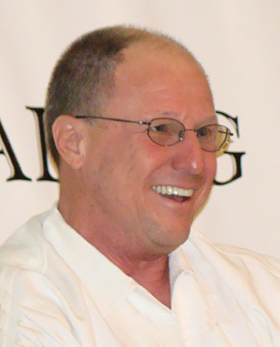
Skip
Hoagland bought MyrtleBeach.com
from original registrant Angie Graves |
"If I recall correctly, it was the
day after passage of the ACPA that I received an
overnight cease-and-desist letter about
Champion.com.
It didn’t have a website, but I had been using it
for years for FTP and email. In fact, it was the
domain for my email address on my business cards when
I attended my first ISOC conference in
Kuala Lumpur in 1997, and for years after that. We filed a counter claim of
Reverse Domain Name Hijacking but later a federal
court judge in Atlanta found for the plaintiff,"
Angie said.
Regarding her
sale of MyrtleBeach.com Angie noted, "Myrtle Beach is my
hometown and
I wanted to deliver the modern Internet to my
hometown, so I registered MyrtleBeach.com. My
business partners and I spent six months building an
interface and back-end services that were
well-advanced for their time, for the benefit of the
Myrtle Beach Area Chamber of Commerce. Our proposal to the Chamber was
not successful, and I moved to Australia shortly after
and didn’t think about it for at least a year. Skip Hoagland
(who was profiled in a July 2008 DNJournal
Cover Story) called one day
after my return to the US |
|
and wanted to talk about
MyrtleBeach.com. I knew of his association with
The Coca-Cola Company and the South Carolina coast, so
agreed to meet with him. We ultimately met
several times over a few months in 1997 and eventually
struck a deal for the .com around December of that
year, and later for MyrtleBeach.net as well." |
|
In recent years,
as Angie became more familiar with companies
in the domain space she also became active in
ICANN
and has remained so for five years now.
"I belong to one of the many
constituencies that make up the ICANN community,
formally named the Commercial and Business Users
Constituency, but usually just called Business
Constituency, or BC, " Angie said. "We exist to promote and protect
the interests of business online and commercial use of
the Internet."
"It is a challenge to get more
small operators involved in the decisions that are
shaping the future of the Internet, and especially
commerce on the Internet. To increase participation, a
bridge needs to be built between ICANN and those who
wish to participate. As a member of the Business
Constituency’s Outreach Committee, I can say that
efforts are being made to increase membership.
And I am interested in and open to hearing ideas about
what would make joining worthwhile to more businesses."
As someone who
has watched Internet and domain developments
for over 20 years now |
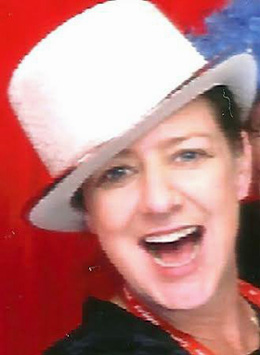
Angie
Graves' profile picture
from the ICANN54 meeting
in Dublin - October 2015 |
|
we asked Angie her thoughts
on the recent arrival of hundreds of new
gTLDs and their future prospects in terms
of both new
registrations and their potential
value as aftermarket assets. "In the near term, I expect we
will see more of the same in terms registration
volumes. For new gTLD registries that built
their business cases on the presumption of higher
demand than they have experienced, it can make great
sense to reevaluate the plan. Over time, the volumes of
registrations will increase. So, for as long as
the domain name system is integral to the operation of
the Internet, increasing numbers of domain name
registrations and renewals will continue to occur.
But we will also over time have more new gTLDs,
too," Angie noted. |
|
"As for public use of new gTLDs,
consider that younger people are not so tied to
“.com” as longtime Internet users may be.
And consider that Internet penetration is only set to
increase among the existing online population.
Also, in the not-too-distant future, those of us who
are online will be spending ever more time online.
These facts make for good long-term prospects for
the new gTLDs as a program," Angie opined.
"With
respect to their aftermarket sales prospects,
there are and will continue to be
“hot spots” of TLDs and second-level names that
draw demand, either over a long or short
period of time – that are not reflective of the
overall marketplace. Profitability has moved from a
marketplace of registrants to a marketplace of
registries and registrars. The profit margins for
registrants and aftermarket buyers that used to exist
with the original gTLDs have been reduced or
eliminated.
|
 |
|
Where we now see those profit
margins is in transaction-based fees in the
aftermarket. And upcoming, we will see
considerable profit margins in more of the new gTLD
registries. Over time, DNS will move more
into the background as human-computer interfaces
continue to show less and less of the mechanics to the
user. Domain names will increasingly serve
mainly a functional purpose," Angie predicted. |
While
Angie obviously has a very busy business life, she
does manage to carve out some personal time. "Social time with friends and
family is high on my list," she said. "I read a lot.
I enjoy playing Scrabble and
other word games. I enjoy live entertainment. I participate in local
government, and with local issues…most recently for
preservation of a county park. I volunteer at the local no-kill
shelter and I am a mentor to teens and young
adults." Of course, now we are wondering how she
has time for a business life but we will save
that story for another day!
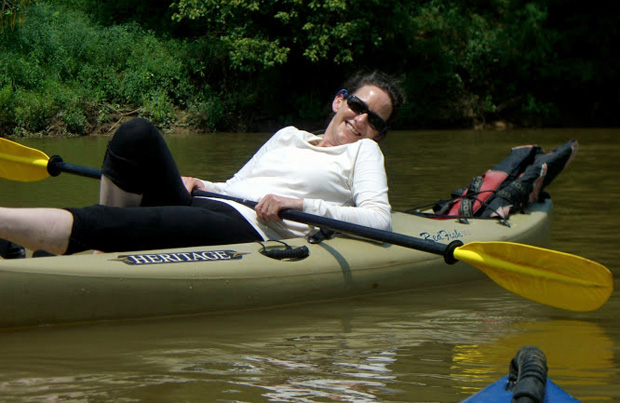
|








